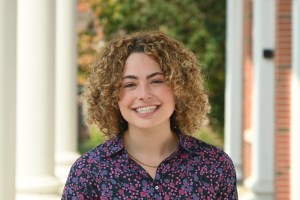Aspen Baker, a sophomore applied health science major at Wheaton College, was used to the regimented routine of the athlete in high school: wake up, eat, school, swim, homework, sleep. Countless hours each day were spent staring at the black line on the bottom of the pool as she strove for her goals with teammates alongside her.
But three meniscus tears later, she found herself redefining life without athletics.
“A huge part of myself is being an athlete and participating in sports, and I feel like the hardest shift was coming into college and that being the cutoff, where I was done,” said Baker.
It was a hard mental shift, she said. Even so, in the time she was unable to go places physically, she leaned on her faith. She said she had come to rely on God’s plan and see what he was teaching her through the frustration.
“I understood my limits more because I knew how far I could push myself without fully going into mayhem,” she said.
For several student athletes at Wheaton, college was supposed to be about practice, games, scores and stretching. Instead, injuries have benched them for some or all of their college seasons. But these four athletes say their injuries, while disappointing, helped them learn and appreciate who they are without sports.
Baker transferred her passion for athletics from the pool to the training room where she now works. Her own past experiences with injuries now allow her to empathize with athletes, helping them as they recover and heal from their own injuries.
“I know how hard the recovery is and I know the mental aspect of, ‘I’m done, what am I gonna do?’” she said. “Especially for seniors, it’s helped me appreciate their strength through it.”
Senior applied health science major Paige Andrews has played softball all four years and dealt with a tear in her throwing shoulder her freshman year and a torn hip labrum following her junior season, which resulted in surgery. Despite many pains and aches throughout her career, she said the athletic trainers have helped support her emotionally and physically as she prepares to get back on the field.
“Being injured as an athlete can be quite frustrating because all I ever want to do is play,” she said. “But having trainers who work with me, support me and help me get back on the field as quickly as possible have helped me both physically and mentally recover from injuries.”
Mansell Amos, a sophomore Bible and theology major on the football team, has had many injuries throughout his time at Wheaton, which have prevented him from being able to play. Similarly to Baker, Amos found his high school football routine almost all-consuming. Coming to Wheaton helped Amos start to see his worth in things other than his performance.
“At a place like Wheaton, whether you’re on the field or off, your value is just as anybody else,” he said. “My value isn’t in how I play, it’s who I am in Christ.”

Amos had coaches who acted as mentors reminding him of that through his injuries. Former defensive coordinator C.J. Nightingale, who now coaches at Belhaven University, was one of those people.
“He would call me and be like, ‘Hey, just remember your identity is in Christ and Christ crucified and what he did for you,’” Amos said.
In his freshman year, Amos tore his pectoral labrum in his shoulder. After rehabbing in the spring, he pinched his hip, forcing him to stop attending spring practices. In the fall of his sophomore year, he got post-concussion syndrome, tore his UCL and tore his chest muscles. Facing adversity over and over through injury caused Amos to question his initial understanding of what being an athlete means.
“Why would I put my identity in something that’s going to be over in four years, or that can be over in an instant?” he said. “I think, whether injured or not, we’re constantly reminded of how much we need the gospel because football will never fill me.”
Abie Brown, a junior on the softball team, also found fulfillment in her faith when she tore her ACL this spring, a season-ending injury requiring eight months of recovery. It was unexpected, and like for Baker and Amos, the hard work and investment she had put into softball made losing the chance to play all the more devastating.
Throughout these past few weeks, Brown has felt a sense of gratitude for God’s presence in her life.
“I would rather him be the strong one than me because I simply couldn’t do it,” she said. “Softball was and is a gift he has given me and it is his gift and ability to take away at any point.”
For Baker, Andrews, Amos and Brown, though injuries have set back their abilities to compete in the sports they love, they are still learning about themselves in other ways. While Baker’s identity isn’t so much about being a swimmer anymore, she wishes she would have told her younger self that that doesn’t matter.
“In the end it has come to work out for the best because I’ve gotten to meet so many incredible people through it,” she said. “Your sport will always come to an end. Just because mine ended four years earlier than I expected it to, that’s okay.”

